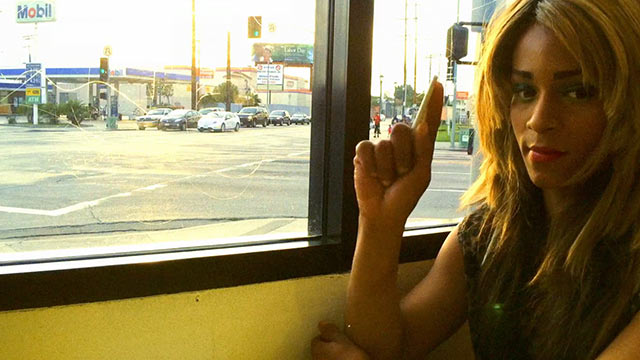For the better part of a decade, the majority of queer cinema has focused on either coming of age/coming out, self-loathing, HIV, celebrating “good” gays, or oppression. Queer cinema has created its own vacuum where we can’t celebrate our lives in a full spectrum of good, bad, and ugly personalities that best reflect the rainbow that makes up a community. Queers haven’t given ourselves permission to be flawed, messy, angry, and human for fear that any one representation will take off in the American consciousness as the defining personality of any particular group, and generate homophobic sentiment in the minds of whatever backwater bumpkins will happen to accidentally stumble on some gay movie in Netflix.
It is with a deep breath of fresh air that Tangerine is about two Los Angeles trans* female prostitutes who don’t give a flying fuck what anybody thinks of them, and are bound to live their life as only they can. Sin-Dee (Kitana Kiki Rodriguez) just got out of jail on Christmas Eve and is having a celebratory donut with her best friend, Alexandra (Mya Taylor) when Alexandra tells her that Chester, their pimp and Sin-Dee’s fiancé has been stepping out on her with another prostitute, this time a fish (a cis-gendered female). From this scene, Tangerine explodes into a film that feels like a cross between a Jerry Springer episode and Richard Linklater’s Slacker. Sin-Dee goes out on a hell-bent mission to find the fish and punish her in front of Chester, Alexandra is trying to gather every contact she can muster to watch her sing that night at the WeHo gay bar Hamburger Mary’s, and there’s also a Russian taxi driver that gets involved in the story.
Fast, furious, and blisteringly hilarious, Tangerine is a bullet that celebrates life in all its various permutations. Writer-director Sean Baker never aims Tangerine at anybody. This could have been a freak show ridiculing a bunch of silly trans* sex workers who don’t know how to control their emotions. Instead, Baker treats everybody with the respect and humanity they deserve, while also pointing out their trainwreck qualities.
Filmed on an iPhone with an animorphic lens, Tangerine has an a distinctly spunky look and energy that feels intimate and distorted. With such a limitation, the cinematography is smart, zesty, imaginative, and extremely intimate with the performers. Packed with necessary close-ups and moving steadycam shots, Tangerine feels unlike most other indie films today. Baker’s color scheme almost makes Los Angeles look as hot, fried, and blistering on Christmas Eve as Spike Lee made Brooklyn look in the middle of summer in Do the Right Thing. Everybody’s brains are frying, and emotions are running on that.
Perhaps the most fascinating aspect of Tangerine is watching more conservative gays try to deal with this big ball of fucked up celebration. Tangerine serves as a reminder of the ideals set out by Pride parades for generations: Take us for what we are, in all of our colorful rainbow of personalities, because we’re not going to change for your acceptance. Tangerine may not reflect my life in any way, shape or form, but I absolutely love it for depicting everybody with a full understanding of the humanity propelling Alexandra and Sin-Dee through their day’s journey. Take it for what it is, because Tangerine offers no apologies. You just better be able to keep up.

